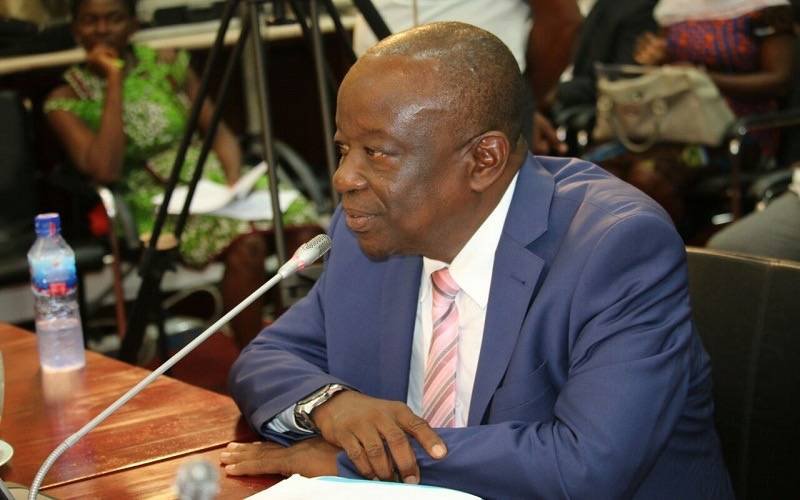Hot!
MPs to ‘grill’ Kan-Dapaah this week over alleged military assault in Garu

The National Security Minister, Albert Kan-Dapaah, is expected to appear in Parliament on November 9, 2023, to answer questions about the attacks on residents of Garu and Tempane in the Upper East Region by military personnel.
Over 50 people were hospitalized after some military personnel allegedly unleashed mayhem on the Garu residents last week.
It is alleged that the military attack was in retaliation for an attack on some National Security operatives by a vigilante group in Garu.
In response to calls by Members of Parliament for an investigation into the matter, Andrew Amoako Asiamah, the Second Deputy Speaker of Parliament who chaired proceedings at the time the concern was raised in the house directed the National Security Minister to brief the legislators on the situation on November 9, 2023.
“At the moment, what I want to do is to invite the Minister to appear before the entire house, come and brief us. Probably what we are hearing is different from what the Minister has at his sleeves. So let us invite the Minister to appear before the house, he will come and brief the house, and we will take it on from there.”
“So I am asking that the Minister appear before the house on Thursday the 9th of November 2023 to brief the house concerning issues related to happenings at Garu and Tempane.”
The Minister’s appearance before Parliament is expected to provide some clarity on the circumstances surrounding the alleged attacks and the government’s response.
One dead over assault by soldiers in Garu
Meanwhile, Citi News understands one of the victims of the recent military brutalities in Garu and Tempane in the Upper East Region has died.
Providing an update on the matter to Citi News, the Member of Parliament (MP) for Garu, Albert Alalzuulga announced the death of one of the victims and the release of eight persons arrested.
“It is sad to announce to you that one of the military brutality victims in Garu has died. It is a very sad development. The youth and everybody in the area are so saddened. We are so disappointed in the military and their actions. And we are disappointed in the government as well. What happened in Garu is most barbaric; it is most unfortunate. The residents who were arrested earlier were released on Friday. While some are home safely, others had to be taken to medical facilities due to their conditions.”
“We are already calling on the government to compensate the victims, and if possible, we may have to take legal action. I don’t think that the treatment of the people of Garu was fair. I think the government needs to address this. The military is taking Ghanaians for granted. It is our tax that has bought the uniforms they are wearing. It is our tax that has bought the vehicles and guns.”
Source: Citinewsroom.com
Hot!
Is the “Rev” title biblical?

In many Ghanaian churches, pastors are often introduced as “Reverend” or simply “Rev.”
The title is seen as a mark of respect, yet its biblical basis continues to stir debate.
While some Christians argue that it is a harmless way to honour church leaders, others insist it is unbiblical and should not be used at all.
Those who question the title usually point to the Bible itself. Nowhere in Scripture did Jesus or the apostles use “Reverend” for themselves or for one another.
Instead, they addressed each other as “brother” or “servant.” In Matthew 23, Jesus even warned his followers not to seek titles such as “rabbi” or “father,” teaching that all believers are equal under one God.
Critics also note that Psalm 111:9 describes God’s name alone as “holy and reverend” in the King James Bible.
To them, this means the word should be reserved for God, not for human beings. Others go further, citing Job 32, which cautions against giving flattering titles to men.
For such voices, the modern use of “Reverend” risks elevating pastors beyond what the Bible prescribes.
On the other hand, defenders of the title argue that it is not meant to replace God’s reverence but simply to acknowledge a minister’s role.
In many churches, “Reverend” is given to ordained ministers who have undergone training, much like the way a doctor is addressed as “Dr.”
The Bible itself, they point out, encourages believers to honour their leaders, with 1 Timothy 5:17 stating that elders who direct the affairs of the church well are “worthy of double honour.”
In this sense, the title is seen as a formal courtesy rather than a theological statement.
Supporters remind critics that Christianity does not operate in a vacuum but within cultural settings.
In Ghanaian society, respect for elders and authority is central to social order. Just as chiefs are addressed with titles such as “Nana” or “Togbe,” many Christians believe it is fitting to extend a similar courtesy to church leaders.
In their view, calling a pastor “Reverend” reflects Ghanaian values of honour and respect, and does not amount to worshipping a human being.
Yet the debate is far from settled. Some argue that the title has been abused, with individuals presenting themselves as “Reverend” without any proper training or accountability.
Calls have even been made for the regulation of church titles to prevent confusion and protect the credibility of ministry. Others, however, see no harm in its continued use, so long as it is not taken beyond what Scripture allows.
At the heart of the matter lies a bigger question: should Christians stick strictly to biblical language when addressing their leaders, or is it acceptable to adapt titles as society evolves?
The conversation is not just theological but cultural, touching on how Ghana balances respect for tradition with the authority of Scripture.
The debate over the “Rev” title is therefore not one with easy answers. What is clear, however, is that it forces us to reflect on how we show honour, how we interpret the Bible, and how faith interacts with our cultural practices.
As the discussion continues in church pews and on social platforms, we ask you: should pastors and ministers be called “Reverend,” or should Christians abandon the title altogether?
By: Jacob Aggrey
Hot!
Police confirm arrest of two suspects in Asankrangwa murder case

The Western Central Regional Police Command has confirmed the arrest of two men in connection with the fatal stabbing of a 20-year-old man at the Asankrangwa Education Area on Sunday, August 17, 2025.
In a statement signed by the Head of the Public Affairs Unit, ASP Beatrice Turkson, the police said preliminary investigations revealed that the deceased was chased and stabbed multiple times by a group of people.
The incident is believed to have stemmed from a misunderstanding between the deceased and one of the suspects, identified as 36-year-old Kwasi Opong.
According to the police, swift action led to the arrest of Opong and another suspect, 23-year-old William Francis Osei. Both are currently in custody assisting with investigations, while efforts are underway to apprehend another suspect who is still on the run.
The police noted that the body of the deceased has been deposited at the Asankrangwa Catholic Hospital morgue for preservation and autopsy.
“The Command assures the public that all persons connected to this heinous crime will be brought to justice,” the statement said.
The police appealed to the public to provide any information that could assist in the ongoing investigations.
By: Jacob Aggrey






